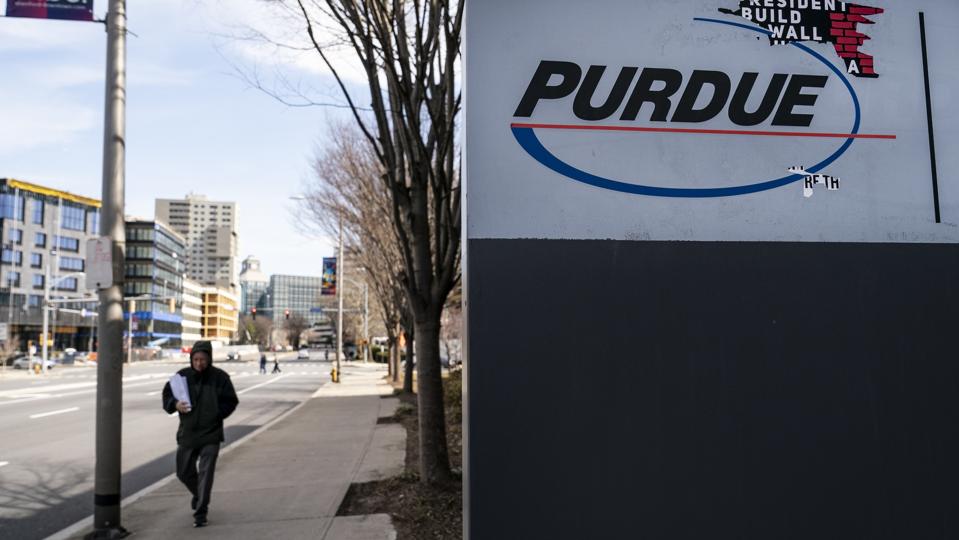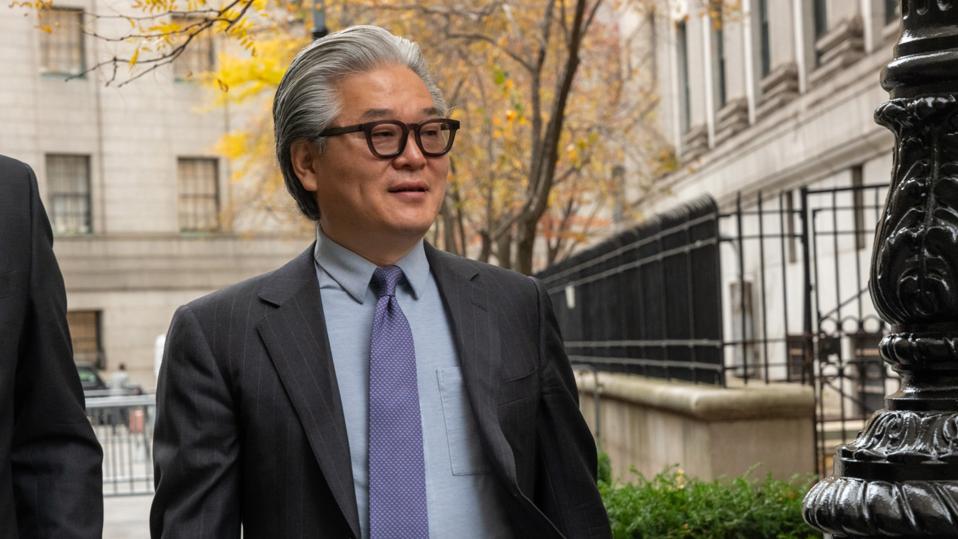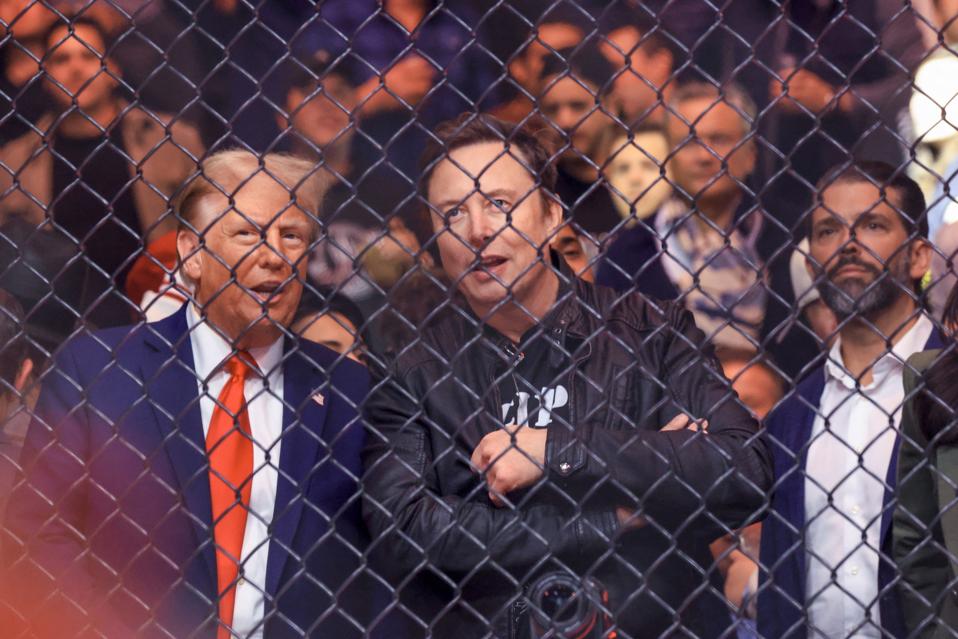Purdue Pharma will go back to court after the Supreme Court thwarted the OxyContin maker’s multibillion-dollar bankruptcy settlement, which would have shielded members of the Sackler family from civil liability for their role in the opioid crisis—and the billionaire family stands to face fresh litigation if the parties can’t figure out a new settlement.

Purdue Pharma headquarters in Stamford, Connecticut on April 2, 2019.
Getty Images
Key Takeaways
- The Supreme Court rejected Purdue Pharma’s bankruptcy settlement with the thousands of individuals, states and other entities who sued the company and some of the Sacklers for their role in perpetuating the opioid epidemic—striking down a provision in the deal that would have allowed the Sacklers to pay $6 billion in exchange for not facing any more civil lawsuits going forward.
- The New York bankruptcy judge overseeing Purdue’s bankruptcy proceedings will hold a hearing on Tuesday, in which the court will consider whether to keep pending litigation against members of the Sackler family on hold while settlement negotiations are underway.
- The committee of creditors that was appointed to oversee the interests of the entities suing the Sacklers—which includes the Blue Cross and Blue Shield Association, CVS, a Texas county government and several Native American tribes—asked the court on Monday to for permission to file a new lawsuit against members of the Sackler family and their associates, if the settlement talks fail.
- The creditors said if a new settlement isn’t reached, “the only path that remains is litigation, and that litigation could be protracted,” arguing that while it would prefer a settlement, the court should let the committee sue on behalf of all the litigants if negotiations fail so that the legal challenges can be resolved quickly, rather than requiring many different cases to all play out individually.
- Lawyers for Purdue Pharma said in a filing while they hope a settlement can be reached, the company agrees the committee should be able to sue if negotiations fail.
- A spokesperson for members of the Sackler family said in a statement the committee’s court filing was “riddled with factual errors” and “contrary to the goal of working together towards a resolution that provides billions of dollars for communities and people in need.”
What To Watch For
The order keeping the lawsuits against the Sackler family on pause is set to expire July 29 if the bankruptcy court decides not to extend it. It’s unclear how long it could take the parties to reach a new settlement—if they can—as previous negotiations took years to complete.
If the committee does move forward with suing members of the Sackler family, their proposed lawsuit asks the court for an unspecified amount in damages—saying that will be determined at trial—though bankruptcy attorneys told Forbes in June the Sacklers will likely have to pay far more than the $6 billion they agreed to in the now-killed settlement.
The committee notes in its court filing that damages in the various lawsuits against the Sacklers are estimated to exceed $1 trillion altogether.
Forbes Valuation
Forbes values the Sackler family’s net worth at $5.2 billion as of February, based on an estimated $11.2 billion in liquid assets minus the $6 billion they were set to pay in the bankruptcy settlement. Only the members of the Sackler family descended from the brothers Mortimer and Raymond Sackler—who previously led Purdue Pharma and are now both deceased—are involved with the opioid litigation and bankruptcy proceedings.
Crucial Quote
“Justice for Purdue’s victims—already far too long delayed—should not be denied for one additional day longer than is necessary,” the committee wrote in its court filing asking for permission to sue the Sacklers, saying it should be granted “so that the potentially years-long battle with the Sacklers and other Defendants can begin promptly, and successfully conclude as soon as possible.”
Chief Critic
Members of the Sackler family—who no longer have any affiliation with Purdue Pharma—have previously claimed they “acted lawfully in all respects,” though they’ve acknowledged OxyContin “unexpectedly became part of the opioid crisis that has brought grief and loss to far too many families and communities.”
In a statement after the Supreme Court struck down Purdue’s settlement, members of the family said they “remain hopeful about reaching a resolution that provides substantial resources to help combat a complex public health crisis” and lamented the possibility of “costly and chaotic legal proceedings in courtrooms across the country.”
“While we are confident that we would prevail in any future litigation given the profound misrepresentations about our families and the opioid crisis, we continue to believe that a swift negotiated agreement to provide billions of dollars for people and communities in need is the best way forward.”
Key Background
Purdue Pharma filed for bankruptcy in 2019 as the Oxycontin manufacturer and members of the Sackler family, who long ran the company and served on its board, came under fire for aggressively marketing the drug that’s widely blamed for helping perpetuate the opioid epidemic.
The committee alleges in its court filing members of the Sackler family “micromanaged the company’s business and operations” and “relentlessly pressured the company and its advisors to do whatever it took to boost sales and drive up OxyContin proceeds,” leading to Purdue allegedly dispensing opioids “without a legitimate medical purpose and outside the usual course of professional practice in violation of federal law.”
The Sacklers have come under widespread condemnation as a result of their actions, facing numerous lawsuits and having their names stripped from museums and cultural institutions around the world. Purdue Pharma and its creditors reached a settlement in 2022 that allowed the Sacklers to escape further civil liability while paying $6 billion to the entities suing them, but the federal government went to the Supreme Court to challenge the agreement, arguing the Sacklers shouldn’t be protected from litigation.
The court ruled in June that the settlement was invalid and the provision shielding the Sacklers from liability was unlawful under the Bankruptcy Code, arguing the Sacklers are trying to go further than federal law allows and should only be absolved of liability if they were filing for bankruptcy themselves, rather than Purdue Pharma.
Are you – or is someone you know -creating the next Afterpay or Canva? Nominations are open for Forbes Australia’s first 30 under 30 list. Entries close midnight, July 31, 2024.
Look back on the week that was with hand-picked articles from Australia and around the world. Sign up for the Forbes Australia newsletter here or become a member here.


